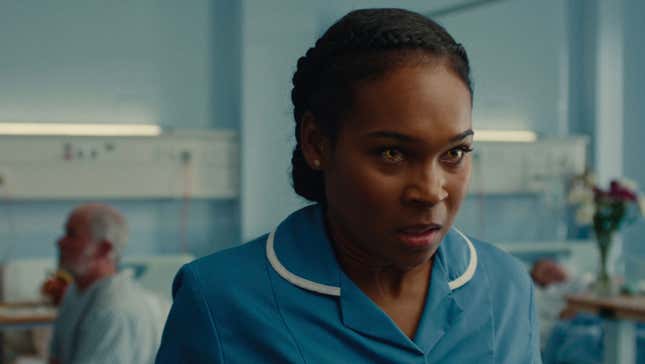
The first two episodes of Supacell could have done a more thorough job of focusing on Sabrina (Nadine Mills) and other women in the show. Instead, they’ve served primarily as support characters for the male narrative. So Sabrina’s episode is the one I’ve been waiting for, as it brings her superpowered struggles into the spotlight. And it turns out she does what many of us would do, especially as a healthcare worker—she consults a physician to check on her brain.
A powerful narrative for Sabrina—almost
Sabrina’s powers—being able to push and move objects, or telekinetic abilities— often manifest in anger. While the narrative of Black women being socially unable to express anger is an important one to explore in a superhero narrative, it’s frustrating to see that Sabrina’s powers and related anxiety also make her careless and spaced out. It’s annoying to see that trope as a big part of the powers and the narrative of the only main non-male character.
Dionne: Not in charge of her own destiny
The episode also centers women more as it follows Dionne (Adelayo Adedayo) on her workday, away from Michael (Tosin Cole). In her role as a social worker, Dionne connects more threads between superhuman people as she discovers information about a missing woman who wasn’t acting human.
However, as Dionne continues her investigation and fills Michael in, he dismisses her and argues with her for being involved, all while refusing to fill her in on the real reason for his concern and anger: that he’s seen her gravestone. He refuses to give Dionne agency in her own survival, and that makes our golden boy superhero entirely less appealing. It’s hard to root for him if you’re viewing the show through a feminist lens.
Cliffhanger resolved
The second episode, which focused on Tazer (Josh Tedeku), ended on a cliffhanger with an imminent threat of violence. The third episode shows the resolution of this scene, with a maze of surprises. This makes the story feel more connected and less episodic, which is increasingly important as Michael uses his time-traveling powers more often. The tighter narrative allows Michael’s disorienting and disruptive powers to enhance the story rather than make it more confusing.
Acceleration and more “random” encounters
Michael’s powers also accelerate the narrative of the story, and we experience his confusion whenever he tries to figure out how far ahead he’s jumped.
As the show goes on, we see the characters have near-misses with each other, then interact more and more directly each episode. In episode 2, we see Andre (Eric Kofi Abrefa) assist Sabrina in an absent-minded moment that could have been fatal. These increasingly tighter connections show how interwoven the characters’ survival, safety—and possibly powers—may be.
Additionally, the increased presence of villain Krazy (Ghetts) moves Sabrina into protective mode, and makes the overall level of violence escalate. The villain exists to further tie the characters’ stories together.
Lack of control: powers at will
One theme Supacell has explored since the first episode is the characters’ agency over their powers. Some characters, in some instances, can control their powers at will. Other times, those powers seem to work randomly, when they’re near another character more, or as the result of an emotional reaction.
This lack of control or agency in using the powers they’re given reflects the racial and socio-economic concerns all of the characters discussed in the first episode. In this way, show creator and executive producer Rapman makes a powerful statement about stratification in England and in general.
Sickle cell comes back into focus
After the sickle cell plot thread disappeared in episode two, it returns in this installment. Michael again assists his mother at the sickle cell clinic, and Andre speaks with his son AJ (Ky-Mani Carty) about the disease as well. This again draws the connection between the name of the show and the disease, which primarily affects Black people, as AJ points out.
This confirms the connection between the characters as being genetic, though the show name also reinforces how the characters need to rely on each other for their survival, a message about Black community.




